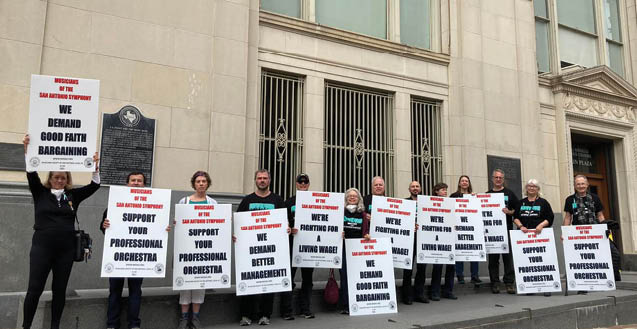Musicians of the San Antonio Symphony continue their strike, pushing for a fair contract for 72 full-time musicians. The musicians, members of Local 23 (San Antonio, TX), went on strike September 27 in response to management’s imposed contract that reduced the number of full-time musicians and cut wages. They have rejected the symphony board’s last offer which essentially would downsize the symphony and cut the base minimum salary for the remaining musicians from $35,700 to $24,000.
As of the last bargaining session on March 8, the board and management were still demanding a significant reduction in the size of the orchestra from 72 positions to 50. The result would be an ensemble too small to perform the great works of Brahms, Tchaikovsky, Mahler, even John Williams, all of which sell tickets and fill halls.
Musicians of the San Antonio Symphony have made it clear that they cannot perform under the conditions that the symphony board wrongfully imposed last September. “The board and management are still demanding a significant reduction in musicians’ wages, already far below industry standards, which together with demanded cuts in health insurance benefits would leave musicians in penury. And yet leadership still refuses to conduct a broad public fundraising appeal,” says Negotiating Committee Chair Mary Ellen Goree.
MOSAS Performance Fund
For the first time since going on strike in September, musicians of the San Antonio Symphony performed concerts. The Local 23 MOSAS Performance Fund gives musicians of the San Antonio Symphony an opportunity to perform and be compensated. Two recent performances by symphony musicians, which were spearheaded by community leaders at the First Baptist Church of San Antonio, drew in 1,700 people.
The MOSAS Performance Fund, a nonprofit organization was established in 2015 through gifts from fellow union members, orchestras, and friends of the symphony. Between the pandemic and the strike, the fund had been dormant, but is now being used to help the musicians who created it. The fund is governed by a board of five musicians of Local 23: Brian Petkovich (president), Peter Rubins (vice president), James Seymour (secretary), Karen Stiles (treasurer), and Stephanie Westney (parliamentarian). Its mission is to present professional symphony concerts and provide educational services to the community.

Buoyed by the recent performance, Petkovich says, “There’s a real hunger to get on stage again.” MOSAS will now need to do its own fundraising, which he calls “an interesting switch.” When Symphony Society of San Antonio (SSSA) claimed lack of funds and the need to stabilize finances, the musicians felt that no major and consistent fundraising had been implemented and they offered to help in fundraising efforts, suggesting the organization broaden its reach to involve more potential donors.
For now, the concerts will provide much- needed relief for the musicians. Petkovich says, “We were inspired by community efforts at the First Baptist Church and are pursuing a relationship with them to keep the concerts going.” He adds, “These performances need to continue to galvanize public support for our profession and be an inspiration to our community.”
Solidarity in Action: BCTGM Donates Union-Made Food to Striking Musicians of the San Antonio Symphony
The members of the Bakery, Confectionery, Tobacco Workers and Grain Millers (BCTGM) know what it’s like to go through a tough strike. Securing fair contracts with food manufacturing giants like Kellogg, Nabisco, and Jon Donaire Desserts within the past year was no easy task. And it’s because of this dedication to solidarity that the international union is donating food made by its own members to support striking musicians at the San Antonio Symphony.
For months, the 72 members of AFM Local 23 have been on strike against the symphony, demanding a fair contract that recognizes their labor to make the cultural organization a success. Local 23 President Richard Oppenheim expressed his thanks to the BCTGM and said this support could not have come at a better time.
“How do we as labor help our sisters and brothers?” asked AFL-CIO Executive Vice President Emerita Linda Chavez-Thompson. “We provide what’s needed to help achieve a better livelihood. Whether this be guidance, sweat, manpower or, in the case of striking symphony workers, food. Labor is always there for each other when times call for solidarity.” Chavez-Thompson was among the volunteers packing up donated food at the San Antonio AFL-CIO offices last week.
The San Antonio central labor council and United Way of San Antonio and Bexar County will be delivering the food to all families of Local 23 in the coming days. The donated bread and snack products were made by BCTGM Local 111 members at the Bimbo Bakeries USA plant in San Antonio.

